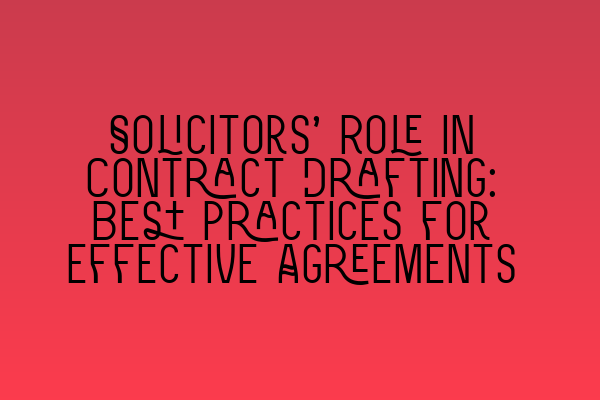Solicitors’ Role in Contract Drafting: Best Practices for Effective Agreements
Contract drafting is a crucial part of a solicitor’s role, as it lays the foundation for any legal agreement. A well-drafted contract helps to clearly outline the rights and obligations of the parties involved, minimizes disputes, and provides a solid legal framework for future reference.
In this article, we will explore the best practices that solicitors should follow when drafting contracts to ensure their effectiveness and enforceability.
Understanding the Parties and their Objectives
Before a solicitor begins drafting a contract, it is essential to have a thorough understanding of the parties involved and their respective objectives. This involves conducting in-depth discussions with the clients to gain insights into their business goals, expectations, and any specific requirements they may have.
By understanding the parties and their objectives, a solicitor can tailor the contract to meet their needs, ensuring that all relevant terms and provisions are included.
Clearly Defined Terms and Language
A contract should be written in clear and concise language. Using complicated legal jargon can lead to confusion and misinterpretation. Therefore, solicitors should strive to use plain language that is easily understandable by all parties involved.
In addition, it is important to define terms clearly within the contract. This helps to avoid any ambiguity and ensures that every party understands the intended meaning of each provision. A glossary of defined terms can be included at the beginning of the contract for easy reference.
Thoroughly Addressing Key Provisions
When drafting a contract, it is crucial to address all key provisions that are relevant to the transaction. Some of the key provisions that should be included are:
- Parties’ names and details
- Subject matter of the contract
- Scope of work or services
- Payment terms and conditions
- Delivery timelines
- Intellectual property rights
- Confidentiality obligations
- Indemnification and liability
- Termination and dispute resolution mechanisms
By ensuring that all key provisions are thoroughly addressed, solicitors can help minimize any potential disputes or misunderstandings between the parties.
Considering Regulatory and Industry Standards
Contracts often need to comply with specific regulatory requirements and industry standards. Solicitors should stay up to date with relevant laws and regulations, ensuring that the contract reflects the current legal landscape.
For example, if the contract involves international trade, the solicitor needs to consider applicable international trade laws and any necessary provisions such as governing law and jurisdiction clauses.
Incorporating Flexibility and Contingency Plans
Life is unpredictable, and circumstances can change. To account for unforeseen events, it is wise to incorporate flexibility and contingency plans within the contract.
By including provisions that allow for modifications or amendments under certain circumstances, solicitors can help their clients adapt to changing situations while still maintaining the overall integrity of the agreement.
Reviewing and Revising the Draft
Once the initial draft of the contract is prepared, it is essential to review and revise it meticulously. Solicitors should pay attention to detail and ensure consistency throughout the document.
It is often helpful to involve the clients in the review process, as they are the ones most familiar with their business needs. Solicitors can address any feedback or concerns raised by the clients and make the necessary revisions to ensure the contract aligns with their requirements.
Conclusion
Contract drafting is a crucial responsibility for solicitors, and by following these best practices, they can create effective and enforceable agreements that protect their clients’ interests. Thorough understanding of the parties and their objectives, clear and concise language, thorough addressing of key provisions, adherence to regulatory and industry standards, incorporation of flexibility and contingency plans, and rigorous review and revision are the key pillars of successful contract drafting.
For additional resources and information on contract drafting and preparation for the SQE exams, check out the following related articles:
